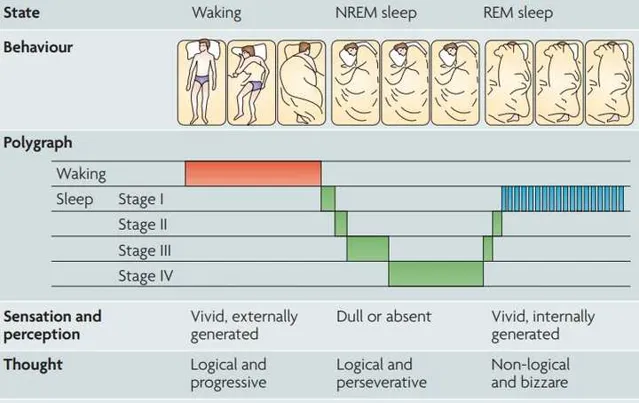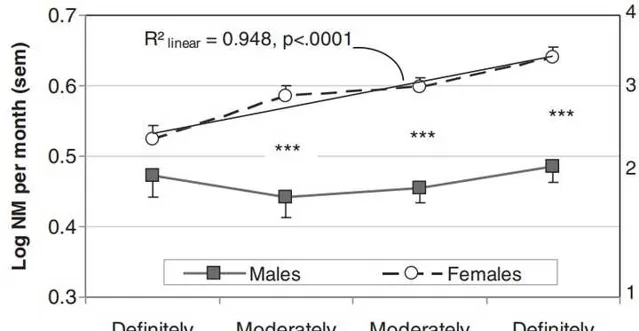噩梦通常出现在睡眠的快速眼动阶段(Rapid Eye Movement, REM) [1] , 这一时期,睡眠深度并不是特别深,大脑的逻辑功能被抑制,当梦境感觉特别真实,梦的内容比较极端,人就容易被惊醒,从而回忆为「噩梦」。所以,「噩梦」这个概念是后验的,做噩梦多的人,做其他缓和性内容的梦的频次也更高,只不过这些梦不会让人惊醒,也就更少形成回忆。

也就是说,噩梦多仅仅是一种片面感受,真实情况是做梦(Vividly Dreams)多 [2] [3] . 也就暗示了一种潜在的异常状态风险,即睡眠障碍(Sleep Disorder) [4] . 而熬夜,本身就是一个睡眠障碍风险因素 [5] ——洲际航班、倒班之后,睡眠质量明显变差,做梦更多,睡醒之后更可能仍然困倦,感觉精力不足 [6] . 另外,噩梦常常跟压力感、恐惧感、焦虑感有关 [7] [8] ,当经常熬夜时,身体的免疫能力减弱,机能受到潜在损害 [9] ,压力感也会因此增加 [10] . 因此,怀疑经常熬夜的人更容易走噩梦是完全合理的。
但具体地,熬夜与噩梦频次直接还存在一定的性别差异 [11] :熬夜对噩梦的因果性在女性中表现显著,但咱男性中表现不显著:

另外,在年龄上也表现出一定的差异:对于成人来说,熬夜对噩梦频次的提升表现更明显,而对于儿童来说不明显:

所以,准确地说,经常熬夜/晚睡的成年女性更容易做噩梦。
参考
- ^ Ross, R. J., Ball, W. A., Dinges, D. F., Kribbs, N. B., Morrison, A. R., Silver, S. M., & Mulvaney, F. D. (1994). Rapid eye movement sleep disturbance in posttraumatic stress disorder. Biological psychiatry, 35(3), 195-202.
- ^ Crick, F., & Mitchison, G. (1983). The function of dream sleep. Nature, 304(5922), 111-114.
- ^ Hobson, J. A. (2009). REM sleep and dreaming: towards a theory of protoconsciousness. Nature Reviews Neuroscience, 10(11), 803-813.
- ^ Schredl, M. (2009). Dreams in patients with sleep disorders. Sleep medicine reviews, 13(3), 215-221.
- ^ Sack, R. L., Auckley, D., Auger, R. R., Carskadon, M. A., Wright Jr, K. P., Vitiello, M. V., & Zhdanova, I. V. (2007). Circadian rhythm sleep disorders: part I, basic principles, shift work and jet lag disorders. Sleep, 30(11), 1460-1483.
- ^ Soleimany, M., Ziba, F. N., Kermani, A., & Hosseini, F. A. T. E. M. E. H. (2007). Comparison of sleep quality in two groups of nurses with and without rotation work shift hours. Iran Journal of Nursing, 20(49), 29-38.
- ^ American Academy of Sleep Medicine. (2005). International classification of sleep disorders. Diagnostic and coding manual, 51-55.
- ^ Selvi, Y., Aydin, A., Gulec, M., Boysan, M., Besiroglu, L., Ozdemir, P. G., & Kilic, S. (2012). Comparison of dream anxiety and subjective sleep quality between chronotypes. Sleep and Biological Rhythms, 10(1), 14-22.
- ^ Irwin, M., McClintick, J., Costlow, C., Fortner, M., White, J., & Gillin, J. C. (1996). Partial night sleep deprivation reduces natural killer and celhdar immune responses in humans. The FASEB journal, 10(5), 643-653.
- ^ Gopalakrishnan, A., Ji, L. L., & Cirelli, C. (2004). Sleep deprivation and cellular responses to oxidative stress. Sleep, 27(1), 27-35.
- ^ Nielsen, T. (2010). Nightmares associated with the eveningness chronotype. Journal of biological rhythms, 25(1), 53-62.











